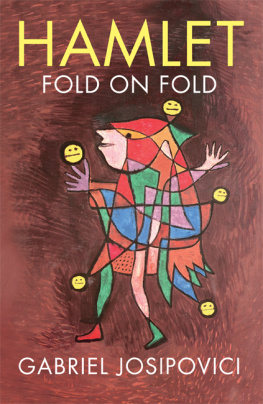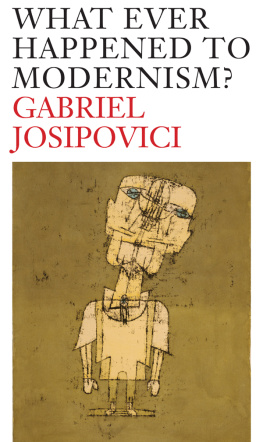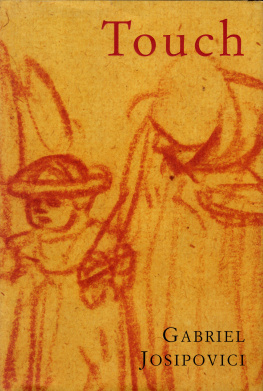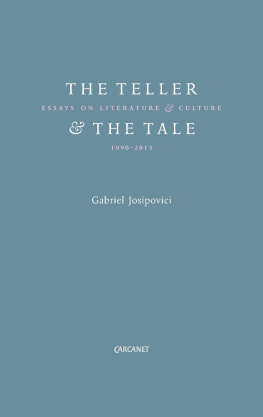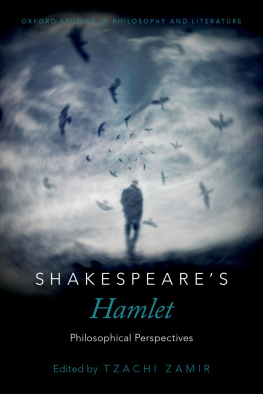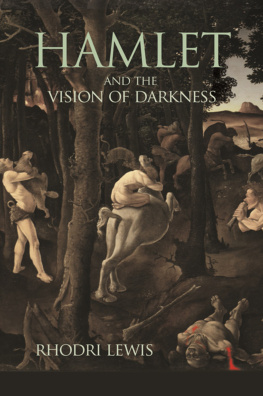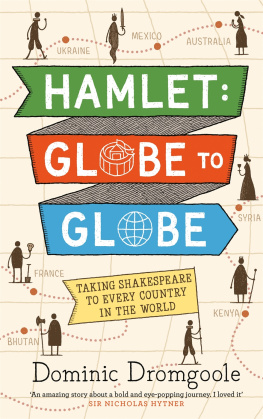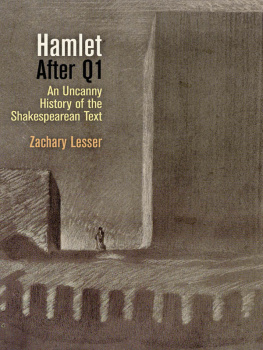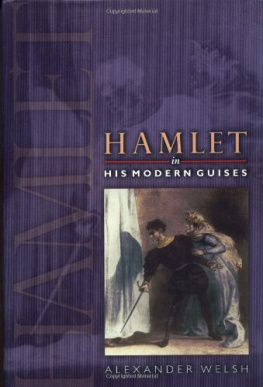

Copyright 2016 Gabriel Josipovici
All rights reserved. This book may not be reproduced in whole or in part, in any form (beyond that copying permitted by Sections 107 and 108 of the U.S. Copyright Law and except by reviewers for the public press) without written permission from the publishers.
For information about this and other Yale University Press publications, please contact:
U.S. office:
Europe Office:
Typeset in Adobe Garamond Pro by IDSUK (DataConnection) Ltd
Printed in Great Britain by TJ International Ltd, Padstow, Cornwall
Library of Congress Cataloging-in-Publication Data
Names: Josipovici, Gabriel, 1940 author.
Title: Hamlet : fold on fold / Gabriel Josipovici.
Description: New Haven : Yale University Press, [2016]
Identifiers: LCCN 2015039587 | ISBN 9780300218329 (hardback)
Subjects: LCSH: Shakespeare, William, 15641616. Hamlet. | Shakespeare, William, 15641616CharactersHamlet. | BISAC: DRAMA / Shakespeare. | LITERARY CRITICISM / Drama.
Classification: LCC PR2807 .J75 2016 | DDC 822.3/3dc23
LC record available at http://lccn.loc.gov/2015039587
A catalogue record for this book is available from the British Library.
10 9 8 7 6 5 4 3 2 1
To Bernard Sharratt and Marion OConnor
About anyone so great as Shakespeare, it is probable that we can never be right; and if we can never be right, it is better that we should from time to time change our way of being wrong.
T.S. Eliot
I take it as some kind of criterion for an understanding of Hamlet that one understands the special fascination this play famously exerts upon us.
Stanley Cavell
CONTENTS
PREFACE
M any years ago, when I was writing plays for the students at the University of Sussex, I wrote a play called Comedy. I had long been fascinated by an image in D.W. Robertsons A Preface to Chaucer from a medieval psalter from Reims, now in Cambridge. The page is divided horizontally in two; in the top portion a group of men are playing the psaltery and bells and decorously singing from choirbooks, while in the bottom half a sort of ape-devil beats on a drum slung round his shoulders while around him men whirl in dance, turn somersaults and stand on their heads. I was seized with the notion of writing a play in which an ape-devil would shout out instructions, such as Comedy!, Tragedy!, Melodrama!, and a small group of performers would leap into words and action. The ape-devil would stop them, start them, move them into the positions on the stage he wished them to adopt and generally control them until, towards the end, the mechanism of his control would start to break down and they would eventually turn against him and destroy him.
In this way, I thought, I would be able to write a series of short plays without being at the mercy of a single plot to which I would be bound for the duration of the evening. But I soon found that I could not both introduce an audience to wholly new plays (or playlets) and then play (yes!) with them as I wished without making the performance intolerably long. I needed instead to make use of plays with which the audience was already familiar. I thus decided to use Hamlet, The Importance of Being Earnest and a hybrid Victorian melodrama to provide the elements of my own drama. Among other things I discovered, while working with my brilliant cast, that it is possible to condense Hamlet into 12 minutes, not just because it is so well known that it only needs a phrase or two to remind the audience of a whole scene, but also because, despite its complexity, it drives forward with great pace from the first moment to the last. Comedy does not work like that. It all depends on timing, on detail, and Wildes masterpiece emerged as a meaningless rush if given the 12-minute treatment. I had to find another way of conveying its essence in a brief compass.
I dont know if my fascination with Hamlet dates from that time or if I chose it as my quintessential tragedy because it already exerted its hold upon me. In my introduction I try to suggest reasons for our belief that we all know and in a sense have always known Hamlet. And because we all feel we know Hamlet, we all have views upon it, and probably all have unfinished business with it. It was that sense of unfinished business which drove me to write this book. And having previously written a book on the Bible I felt that I was inured to the criticism or condescension that would naturally come my way from scholars who have made Shakespeare or even just Hamlet their life-study. This does not mean that I have paid no attention to recent (and not so recent) scholarship on and criticism of the play. I have, but not in any thorough or systematic fashion. Rather, I have picked my way through it, reading what seemed illuminating to me and ignoring the rest. I cannot see a way round that, since I would never have been able to write my book had I attempted to read the bulk of what has been written on Hamlet, and it was a book I felt I needed to write. If I have blundered or merely repeated a well-known argument as though it were my own, I ask forgiveness.
Many people have given me their support. Brian Cummings first suggested I write on Hamlet. Bernard Sharratt read an earlier draft and gave me encouragement and twenty closely typed pages of his comments, which made me feel he ought to be writing it, not I. George Craig and Charles Nicholl too were enormously encouraging and gave me the confidence to go on in my own way. Steve Mitchelmore, Giglia Sprigge and Victoria Harding all read early drafts and responded with warmth and detailed criticism, which is what one expects of friends. At Yale I have benefited from the support and encouragement of Robert Baldock for close on thirty and Candida Brazil for close on twenty years. Such long-term links not just with a publisher but with individual editors is of vital importance for any writer and is, alas, becoming the exception rather than the rule. I am aware how lucky I have been. At a crucial moment in the writing I was encouraged to continue by attending a Jewish funeral and hearing the son, at the climax of his eulogy to his father, turn to the coffin and quote Horatios dirge on Hamlet: Good night, sweet Prince, and flights of angels sing thee to thy rest. Tamar Miller was, as always, more than supportive. Needless to say, all the faults that remain are my own.
NOTE ON SOURCES
F or ease of reference, all Hamlet quotations are from the best-known and most used modern edition of the play, that in the Arden Shakespeare, Second Series, ed. Harold Jenkins, 1982. Line references in the headings to the subsections of each fold also refer to Jenkinss edition as do references in brackets in the text. References to other Shakespeare plays are to the one-volume Pelican Shakespeare, ed. Alfred Harbage, 1969.
INTRODUCTION
S cene 3 of Heiner Mllers 1977 play Hamletmachine goes like this:
SCHERZO
The university of the dead. Whispering and muttering. From their gravestones (lecterns) the dead philosophers throw their books at Hamlet. Gallery (ballet) of the dead women. The woman dangling from the rope. The woman with her arteries cut open, etc. Hamlet views them with the attitude of a visitor in a museum (theatre). The dead women tear his clothes off his body. Out of an upended coffin, labelled HAMLET I, step Claudius and Ophelia, the latter dressed and made up like a whore. Striptease by Ophelia.
Next page
